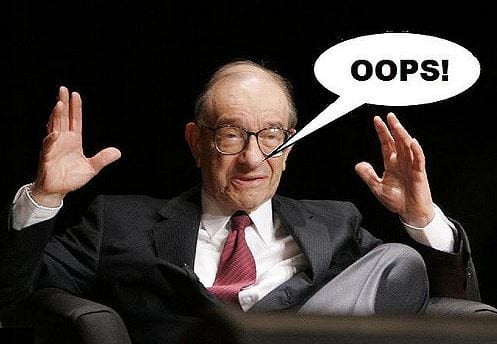
Greenspan Put: Rates Won’t Rise Soon
Updated Aug 30, 2023
As we delve into the concept of the Greenspan put, it’s evident that our discussion must be rooted in a historical context. This is due to the fact that Greenspan vacated the position of Fed chairman long ago. Therefore, our focus will primarily center on historical perspectives.
In a conversation with former SEC Chairman Arthur Levitt, Greenspan expressed concerns about the imminent increase in interest rates. However, we hold a different viewpoint. Negative interest rates are increasingly commonplace, and no nation would risk damaging its economy by raising rates. Consequently, Greenspan’s anticipation of rising rates should be disregarded or regarded as the musings of an unsound mind.
While Greenspan held a pessimistic view of the Euro, he believed that the European Union was fundamentally unworkable. As the primary beneficiary, Germany gains a competitive advantage through a weaker currency, which is pivotal for its export-oriented economic model. Meanwhile, economically disadvantaged member states are enticed by low-interest loans that appear favourable until they face difficulties repaying them, as seen in the case of Greece. Full Story
Greenspan Put Concept Valid, But His Recent Thoughts —Not
Recent statements by the former Federal Reserve Chairman, Greenspan, regarding interest rates and the European Union appear to be inaccurate, and we suspect he is aware of this fact. The global trend is leaning toward negative interest rates, and any nation daring to increase rates risks damaging its economy. While the concept of the Greenspan Put has its merits, particularly for major players, his recent perspectives seem unsubstantiated.
In terms of the European Union, Greenspan’s assessment holds some validity. The EU operates under the guidance of unelected bureaucrats in Brussels who impose regulations and collect funds from nations, making life more challenging for them. The EU primarily benefits Germany, enabling it to maintain an export-focused model with a devalued currency. In contrast, less affluent member states are lured into a cycle of borrowing through low-interest loans, eventually leading to catastrophic outcomes, as exemplified by Greece.
Recognizing the importance of mass psychology is crucial for successful market navigation. It can identify trends across various markets when employed effectively, enabling investors to safeguard their interests and capitalize on emerging opportunities. Remembering crises can serve as openings for those prepared to seize them is essential. While the Greenspan Put concept may appeal, relying on it blindly is unwise. Markets can experience downturns at times, and investors must be ready for adverse scenarios.
Expanded Overview: The Greenspan Put – A Financial Safety Net and Its Implications
The “Greenspan Put” is a term that originated during Alan Greenspan’s tenure as Chairman of the Federal Reserve from 1987 to 2006. This term refers to the perceived policy of the Federal Reserve to lower interest rates and inject liquidity into the market during periods of financial crisis. This policy effectively created a safety net for investors, acting as a symbolic “put option,” a financial instrument that allows holders to sell assets at an agreed price, thereby protecting against falling prices.
One notable example of the Greenspan Put in action was during the 1997 Asian Financial Crisis. The Federal Reserve, under Greenspan’s leadership, lowered interest rates, providing much-needed liquidity to the markets. This action was seen as a move to shield investors from the full impact of the crisis, functioning similarly to how a put option would.
Another instance was during the Dot-com bubble burst in 2000. The Federal Reserve again lowered interest rates to stimulate economic growth and prevent a full-blown financial crisis. This move was seen as another example of the Greenspan Put, reinforcing the perception of the Federal Reserve’s role as a protector of financial markets.
However, the Greenspan Put has been subject to criticism. While it provided short-term market stability, this strategy has been criticized for encouraging excessive risk-taking by creating an expectation of Federal Reserve intervention during downturns. Critics argue that this policy may have contributed to subsequent financial crises, including the 2008 financial crisis, by fostering a culture of moral hazard among investors.
In conclusion, the Greenspan Put represents a significant chapter in the history of U.S. monetary policy. Its legacy continues to influence the expectations and behaviours of investors, as well as the strategies of central banks worldwide.
Random suggestions
Lastly, we suggest living below your means and putting your money to work in the stock market. Mass Psychology knows no limits and can help you spot trends in any market, allowing you to protect yourself and benefit from these new trends. Remember, disaster is just a code word for opportunity.
Subscribe to our free newsletter to keep abreast of the latest developments; we cover everything from the financial markets to the World’s food supplies.
Originally published on August 30, 2016, this content has undergone periodic updates over the years, with the most recent revision completed in July 2023.
Other Articles of Interest
Meet the dollar vigilantes
How To Be Happy: Epicurus Had The Answer 1700 Years Ago

The Factors That Make Corporate Fraud More Likely
Microsoft Growing Cloud Business
Low Commodity Prices & Strong Dollar Destroying Sovereign Credit Ratings
Financial services industry desperately trying to Attract Millennials
Is The Bull Market Over? Mass Sentiment States It’s Not
Commodities Increased in April
Fossil Fuel Divestment Trends gain momentum
Plunging battery prices set to fuel surge in demand for EV’s
Media Manipulation; The Fraudulent Economic Recovery
Hidden Agenda Review; All three wars were predicted decades ago
Identify Market Opportunities: Negativity Equates to Opportunity
Experimental Group Definition Psychology: The Crowd
Saving for retirement: Invest in stocks & retire rich


